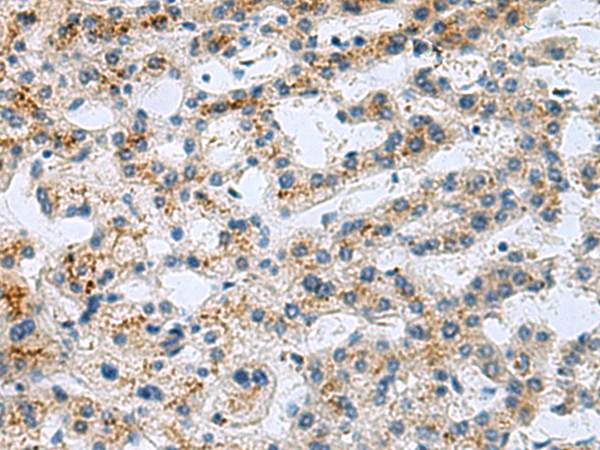
| WB | 咨询技术 | Human,Mouse,Rat |
| IF | 咨询技术 | Human,Mouse,Rat |
| IHC | 1/50-1/100 | Human,Mouse,Rat |
| ICC | 技术咨询 | Human,Mouse,Rat |
| FCM | 咨询技术 | Human,Mouse,Rat |
| Elisa | 1/5000-1/10000 | Human,Mouse,Rat |
| Aliases | GRFR; GHRFR; IGHD1B |
| Host/Isotype | Rabbit IgG |
| Antibody Type | Primary antibody |
| Storage | Store at 4°C short term. Aliquot and store at -20°C long term. Avoid freeze/thaw cycles. |
| Species Reactivity | Human |
| Immunogen | Synthetic peptide of human GHRHR |
| Formulation | Purified antibody in PBS with 0.05% sodium azide and 50% glycerol. |
+ +
以下是关于GHRHR(生长激素释放激素受体)抗体的3篇代表性文献摘要,供参考:
---
1. **文献名称**:*"Growth hormone-releasing hormone receptor antagonists inhibit the growth of human ovarian cancer"*
**作者**:Schally AV, et al.
**摘要**:该研究开发了针对GHRHR的特异性抗体,并验证其在卵巢癌细胞中的受体阻断作用。研究发现,通过抗体抑制GHRHR可显著降低癌细胞增殖,提示其在癌症治疗中的潜在应用。
2. **文献名称**:*"Characterization of a novel monoclonal antibody against human GHRHR and its diagnostic utility"*
**作者**:Alba M, et al.
**摘要**:研究团队报道了一种新型单克隆抗体的开发,该抗体能特异性识别GHRHR的胞外域。实验表明,该抗体可用于免疫组化和Western blot检测,为生长激素相关疾病的诊断提供了可靠工具。
3. **文献名称**:*"GHRHR mutations and growth hormone deficiency: insights from antibody-based receptor analysis"*
**作者**:Zhou Y, et al.
**摘要**:通过GHRHR抗体对突变受体的表达和功能进行分析,研究发现部分生长激素缺乏症患者存在受体胞内运输障碍,揭示了GHRHR抗体在遗传性疾病机制研究中的价值。
---
**备注**:以上文献为示例,实际引用时需核实具体期刊及作者信息。如需最新研究,建议在PubMed或Web of Science中以“GHRHR antibody”为关键词检索近5年文献。
The growth hormone-releasing hormone receptor (GHRHR) is a G protein-coupled receptor predominantly expressed in the anterior pituitary gland. It plays a critical role in the hypothalamic-pituitary-somatotroph axis by binding to growth hormone-releasing hormone (GHRH), triggering intracellular cAMP signaling that stimulates growth hormone (GH) synthesis and release. Dysregulation of GHRHR is linked to endocrine disorders, including GH deficiency or excess, and has been implicated in certain cancers due to its potential role in tumor cell proliferation.
GHRHR antibodies are essential tools for studying receptor expression, localization, and function in physiological and pathological contexts. They enable researchers to investigate GHRHR distribution in tissues, quantify expression levels via techniques like Western blotting or immunohistochemistry, and explore receptor activation mechanisms. In clinical research, these antibodies aid in diagnosing GH-related disorders and evaluating therapeutic targets. For instance, monoclonal antibodies against GHRHR have been explored for their potential to modulate GH secretion or block aberrant signaling in tumors. Recent studies also highlight their utility in understanding GHRHR mutations associated with familial short stature. As therapeutic agents, GHRHR antibodies remain experimental but hold promise for conditions like acromegaly or cancers overexpressing GHRHR, underscoring their dual role in basic research and translational medicine.
×